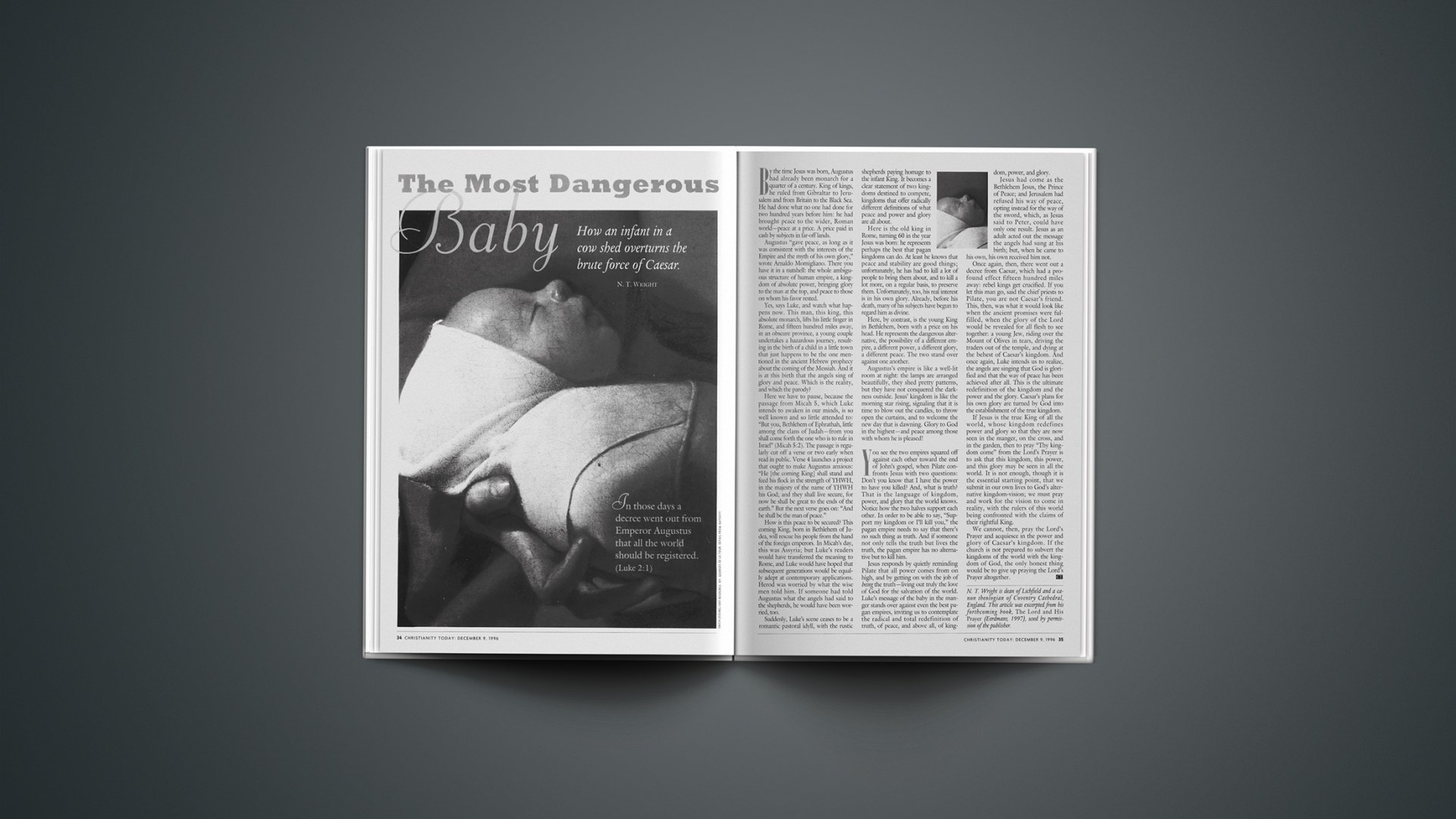By the time Jesus was born, Augustus had already been monarch for a quarter of a century. King of kings, he ruled from Gibraltar to Jerusalem and from Britain to the Black Sea. He had done what no one had done for two hundred years before him: he had brought peace to the wider, Roman world—peace at a price. A price paid in cash by subjects in far-off lands.
Augustus "gave peace, as long as it was consistent with the interests of the Empire and the myth of his own glory," wrote Arnaldo Momigliano. There you have it in a nutshell: the whole ambiguous structure of human empire, a kingdom of absolute power, bringing glory to the man at the top, and peace to those on whom his favor rested.
Yes, says Luke, and watch what happens now. This man, this king, this absolute monarch, lifts his little finger in Rome, and fifteen hundred miles away, in an obscure province, a young couple undertakes a hazardous journey, resulting in the birth of a child in a little town that just happens to be the one mentioned in the ancient Hebrew prophecy about the coming of the Messiah. And it is at this birth that the angels sing of glory and peace. Which is the reality, and which the parody?
Here we have to pause, because the passage from Micah 5, which Luke intends to awaken in our minds, is so well known and so little attended to: "But you, Bethlehem of Ephrathah, little among the clans of Judah—from you shall come forth the one who is to rule in Israel" (Micah 5:2). The passage is regularly cut off a verse or two early when read in public. Verse 4 launches a project that ought to make Augustus anxious: "He [the coming King] shall stand and feed his flock in the strength of YHWH, in the majesty of the name of YHWH his God; and they shall live secure, for now he shall be great to the ends of the earth." But the next verse goes on: "And he shall be the man of peace."
How is this peace to be secured? This coming King, born in Bethlehem of Judea, will rescue his people from the hand of the foreign emperors. In Micah's day, this was Assyria; but Luke's readers would have transferred the meaning to Rome, and Luke would have hoped that subsequent generations would be equally adept at contemporary applications. Herod was worried by what the wise men told him. If someone had told Augustus what the angels had said to the shepherds, he would have been worried, too.
Suddenly, Luke's scene ceases to be a romantic pastoral idyll, with the rustic shepherds paying homage to the infant King. It becomes a clear statement of two kingdoms destined to compete, kingdoms that offer radically different definitions of what peace and power and glory are all about.
Here is the old king in Rome, turning 60 in the year Jesus was born: he represents perhaps the best that pagan kingdoms can do. At least he knows that peace and stability are good things; unfortunately, he has had to kill a lot of people to bring them about, and to kill a lot more, on a regular basis, to preserve them. Unfortunately, too, his real interest is in his own glory. Already, before his death, many of his subjects have begun to regard him as divine.
Here, by contrast, is the young King in Bethlehem, born with a price on his head. He represents the dangerous alternative, the possibility of a different empire, a different power, a different glory, a different peace. The two stand over against one another.
Augustus's empire is like a well-lit room at night: the lamps are arranged beautifully, they shed pretty patterns, but they have not conquered the darkness outside. Jesus' kingdom is like the morning star rising, signaling that it is time to blow out the candles, to throw open the curtains, and to welcome the new day that is dawning. Glory to God in the highest—and peace among those with whom he is pleased!
You see the two empires squared off against each other toward the end of John's gospel, when Pilate confronts Jesus with two questions: Don't you know that I have the power to have you killed? And, what is truth? That is the language of kingdom, power, and glory that the world knows. Notice how the two halves support each other. In order to be able to say, "Support my kingdom or I'll kill you," the pagan empire needs to say that there's no such thing as truth. And if someone not only tells the truth but lives the truth, the pagan empire has no alternative but to kill him.
Jesus responds by quietly reminding Pilate that all power comes from on high, and by getting on with the job of being the truth—living out truly the love of God for the salvation of the world. Luke's message of the baby in the manger stands over against even the best pagan empires, inviting us to contemplate the radical and total redefinition of truth, of peace, and above all, of kingdom, power, and glory.
Jesus had come as the Bethlehem Jesus, the Prince of Peace; and Jerusalem had refused his way of peace, opting instead for the way of the sword, which, as Jesus said to Peter, could have only one result. Jesus as an adult acted out the message the angels had sung at his birth; but, when he came to his own, his own received him not.
Once again, then, there went out a decree from Caesar, which had a profound effect fifteen hundred miles away: rebel kings get crucified. If you let this man go, said the chief priests to Pilate, you are not Caesar's friend. This, then, was what it would look like when the ancient promises were fulfilled, when the glory of the Lord would be revealed for all flesh to see together: a young Jew, riding over the Mount of Olives in tears, driving the traders out of the temple, and dying at the behest of Caesar's kingdom. And once again, Luke intends us to realize, the angels are singing that God is glorified and that the way of peace has been achieved after all. This is the ultimate redefinition of the kingdom and the power and the glory. Caesar's plans for his own glory are turned by God into the establishment of the true kingdom.
If Jesus is the true King of all the world, whose kingdom redefines power and glory so that they are now seen in the manger, on the cross, and in the garden, then to pray "Thy kingdom come" from the Lord's Prayer is to ask that this kingdom, this power, and this glory may be seen in all the world. It is not enough, though it is the essential starting point, that we submit in our own lives to God's alternative kingdom-vision; we must pray and work for the vision to come in reality, with the rulers of this world being confronted with the claims of their rightful King.
We cannot, then, pray the Lord's Prayer and acquiesce in the power and glory of Caesar's kingdom. If the church is not prepared to subvert the kingdoms of the world with the kingdom of God, the only honest thing would be to give up praying the Lord's Prayer altogether.
N. T. Wright is dean of Lichfield and a canon theologian of Coventry Cathedral, England. This article was excerpted from his forthcoming book, The Lord and His Prayer (Eerdmans, 1997), used by permission of the publisher.
Copyright © 1996 Christianity Today. Click for reprint information.










